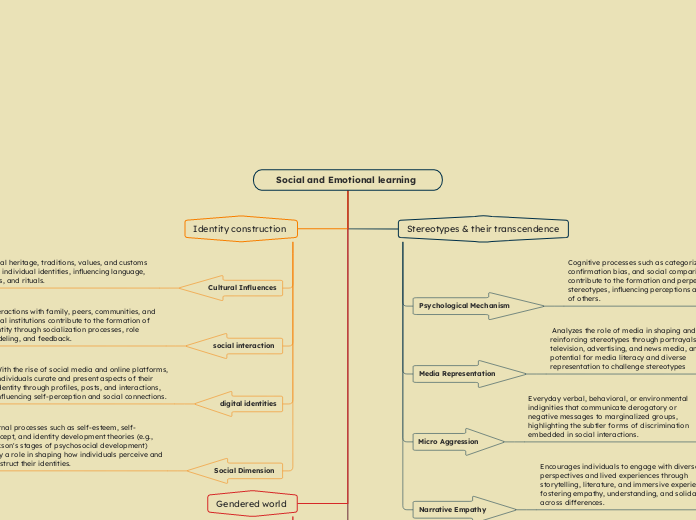Social and Emotional learning
Stereotypes & their transcendence
Psychological Mechanism
Cognitive processes such as categorization, confirmation bias, and social comparison contribute to the formation and perpetuation of stereotypes, influencing perceptions and judgments of others.
Media Representation
Analyzes the role of media in shaping and reinforcing stereotypes through portrayals in film, television, advertising, and news media, and the potential for media literacy and diverse representation to challenge stereotypes
Micro Aggression
Everyday verbal, behavioral, or environmental indignities that communicate derogatory or negative messages to marginalized groups, highlighting the subtler forms of discrimination embedded in social interactions.
Narrative Empathy
Encourages individuals to engage with diverse perspectives and lived experiences through storytelling, literature, and immersive experiences, fostering empathy, understanding, and solidarity across differences.
discrimination and its forms
Legal Framework
Examines anti-discrimination laws, human rights declarations, and international conventions aimed at protecting individuals from discrimination based on race, gender, ethnicity, religion, disability, sexual orientation, and other characteristics
Environmental Justice
Explores how discrimination intersects with environmental issues, analyzing how marginalized communities bear disproportionate burdens of pollution, climate change impacts, and lack of access to clean air, water, and green spaces.
Health Disparity
Investigates how discrimination contributes to disparities in healthcare access, treatment, and outcomes, affecting marginalized groups' physical and mental well-being and perpetuating cycles of inequality.
Identity construction
Cultural Influences
Cultural heritage, traditions, values, and customs shape individual identities, influencing language, beliefs, and rituals.
social interaction
Interactions with family, peers, communities, and social institutions contribute to the formation of identity through socialization processes, role modeling, and feedback.
digital identities
With the rise of social media and online platforms, individuals curate and present aspects of their identity through profiles, posts, and interactions, influencing self-perception and social connections.
Social Dimension
nternal processes such as self-esteem, self-concept, and identity development theories (e.g., Erikson's stages of psychosocial development) play a role in shaping how individuals perceive and construct their identities.
Gendered world
Feminist Perspective
Feminist theories (e.g., liberal feminism, radical feminism, intersectional feminism) analyze power dynamics, patriarchy, and gender inequality, advocating for gender equity and dismantling oppressive structures.
Masculinity Services
Examines societal expectations and norms surrounding masculinity, addressing issues such as toxic masculinity, male privilege, and the impact on men's mental health and relationships.
Queer Theory
Challenges binary notions of gender and sexuality, emphasizing fluidity, nonconformity, and the importance of self-identification in understanding diverse experiences and identities.
Global Perspective
Recognizes cultural variations in gender roles and expressions, exploring how different societies construct and enforce gender norms, and the implications for individual agency and freedom.
